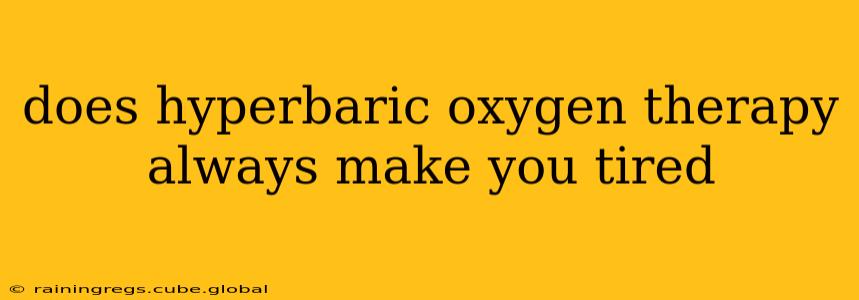Does Hyperbaric Oxygen Therapy Always Make You Tired?
Hyperbaric oxygen therapy (HBOT) is a medical treatment where you breathe 100% oxygen in a pressurized chamber. While it's effective for various conditions, many patients wonder about its potential side effects, particularly fatigue. The simple answer is no, HBOT doesn't always make you tired, but it can lead to tiredness in some individuals, and understanding why is crucial.
What is Hyperbaric Oxygen Therapy (HBOT)?
Before delving into fatigue, let's briefly understand HBOT. This therapy increases the amount of oxygen your blood can carry, allowing it to reach areas that might be oxygen-deprived due to injury or illness. This increased oxygen can promote healing and reduce inflammation. Conditions treated with HBOT include decompression sickness, carbon monoxide poisoning, severe wounds, and certain infections.
Why Might HBOT Cause Fatigue?
Several factors can contribute to fatigue after an HBOT session:
-
Oxygen Toxicity: While oxygen is essential for life, high concentrations can be toxic if inhaled for prolonged periods. This oxygen toxicity can lead to various side effects, including fatigue, nausea, and visual disturbances. The body is not designed to process that level of oxygen continuously. The amount of oxygen delivered and the duration of treatment are carefully managed to minimize this risk.
-
Increased Metabolic Rate: HBOT can increase your body's metabolic rate. This increased activity, while beneficial for healing, can also lead to feelings of tiredness, especially if the treatment is intense or if you're already fatigued before the session.
-
Individual Sensitivity: People respond differently to HBOT. Some might experience minimal side effects, while others may be more sensitive and experience fatigue more prominently. Pre-existing health conditions or medications can also influence an individual's response.
-
Treatment Duration and Pressure: Longer treatment sessions and higher pressure levels can increase the likelihood of experiencing fatigue. These variables are meticulously chosen by healthcare professionals to balance treatment efficacy and potential side effects.
-
Dehydration: It is important to stay well-hydrated before, during, and after HBOT. Dehydration can worsen fatigue.
How Long Does HBOT-Induced Fatigue Last?
The duration of HBOT-related fatigue varies greatly depending on the individual and the treatment parameters. For some, it might subside within a few hours, while others may experience lingering tiredness for a day or two. It's crucial to listen to your body and allow for adequate rest following treatment.
What Can I Do to Minimize Fatigue After HBOT?
Several strategies can help mitigate fatigue after HBOT:
- Stay Hydrated: Drink plenty of water before, during, and after your session.
- Eat a Nutritious Diet: A balanced diet rich in nutrients provides the energy your body needs to recover.
- Get Adequate Rest: Allow for sufficient rest and sleep after your HBOT session.
- Avoid Strenuous Activity: Refrain from intense physical exertion immediately following the treatment.
- Communicate with Your Doctor: If you experience excessive or prolonged fatigue, consult your physician.
Does HBOT Always Cause Fatigue? A Final Word
While fatigue is a possible side effect of HBOT, it's not a universal experience. The intensity and duration of fatigue vary depending on individual factors and treatment protocols. Proper hydration, adequate rest, and communication with your healthcare provider are key to minimizing any discomfort and maximizing the benefits of HBOT. Always consult with a medical professional before undergoing HBOT to discuss potential risks and benefits based on your specific health situation.
